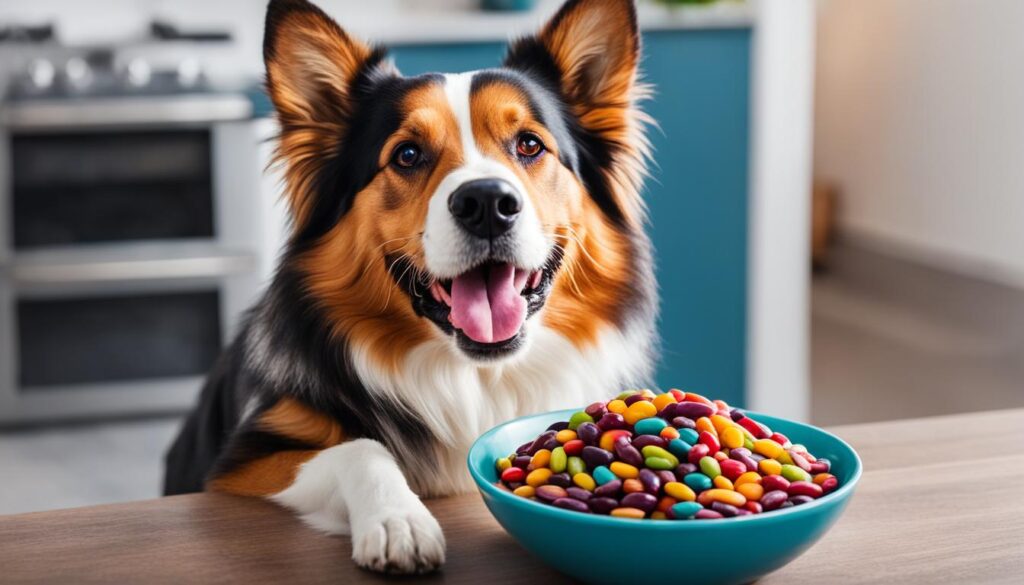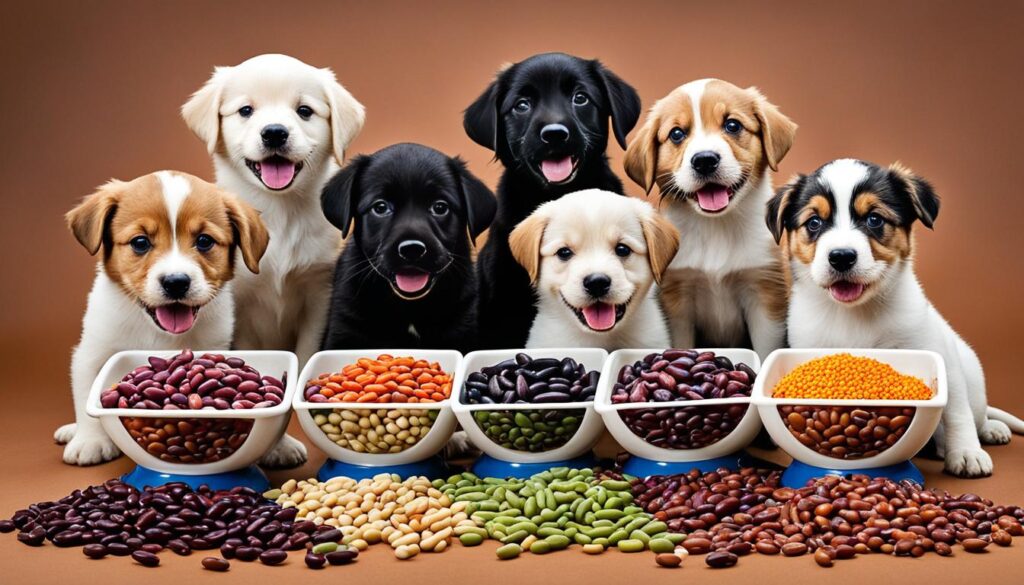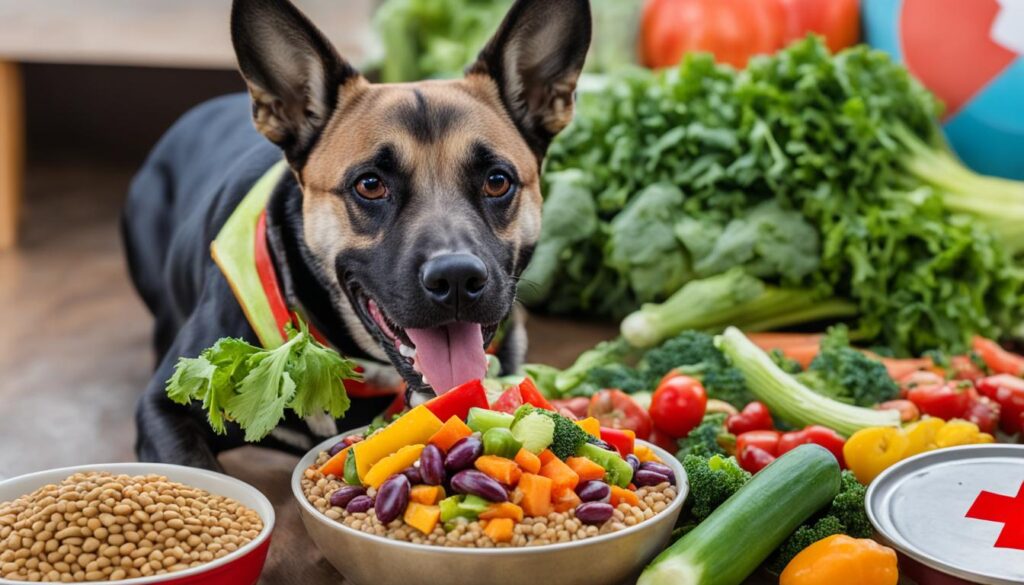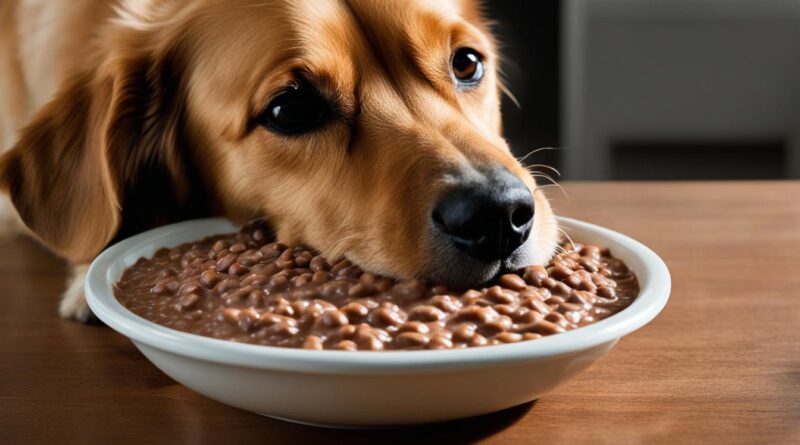Can Dogs Eat Refried Beans? Find Out if Refried Beans are Good for Dogs
Are you wondering whether it’s safe to feed your dog refried beans? While these tasty legumes may be a staple in your own diet, they may not be suitable for your furry friend. Refried beans, often packed with ingredients like garlic, onions, and spices, can pose potential health risks for dogs.
One of the key concerns with refried beans is their high fat content. Dogs are more susceptible to developing pancreatitis, a serious inflammation of the pancreas, when consuming fatty foods. Additionally, the canning process of refried beans introduces a significant amount of sodium, which can be detrimental to dogs with heart conditions or high blood pressure.
It’s important to prioritize your dog’s health and well-being, and that means being cautious about the foods they consume. Keep reading to understand the risks associated with feeding refried beans to dogs and discover safe alternatives that can still provide them with essential nutrients.
Key Takeaways:
- Refried beans can be harmful to dogs due to their ingredients and high fat content.
- Dogs are more susceptible to developing pancreatitis from consuming fatty foods like refried beans.
- The canning process of refried beans adds a significant amount of sodium, which can be dangerous for dogs with certain health conditions.
- It’s best to avoid feeding refried beans to your dog and focus on safe alternatives that provide essential nutrients.
Are Beans Good for Dogs? Understanding the Benefits and Limitations of Beans for Dogs
When it comes to adding variety to your dog’s diet, beans can be a nutritious option. Most beans are safe for dogs and offer several benefits when incorporated into their meals. However, it’s important to understand the limitations and ensure proper preparation to keep your furry friend healthy and happy.
Benefits of Beans for Dogs:
- Protein Source: Beans are a rich source of plant-based protein, which is essential for muscle development and overall health in dogs.
- Fiber Content: The high fiber content in beans can aid in digestion and promote healthy bowel movements in dogs. It can also help regulate blood sugar levels.
- Vitamins and Minerals: Beans contain various vitamins and minerals that contribute to a dog’s overall well-being, including vitamin C, vitamin K, folate, iron, and potassium.
- Low in Fat: Beans are generally low in fat, making them a suitable choice for dogs on a low-fat diet or those prone to weight gain.
- Amino Acids: Beans provide essential amino acids that dogs need for optimal growth, repair, and maintenance of body tissues.
Limitations of Feeding Dogs Beans:
- Toxic Ingredients: When feeding beans to dogs, it’s crucial to avoid adding ingredients that can be harmful. Skip seasonings like garlic, onions, or salt, as they can be toxic to dogs.
- Sodium Content: Canned beans often contain high levels of sodium, which can be detrimental to dogs with heart conditions or high blood pressure. Opt for fresh or frozen beans instead.
- Gas and Digestive Issues: Introducing beans too quickly or in large quantities can cause digestive discomfort in dogs, resulting in gas and bloating. Start with small amounts and monitor their reaction.
To safely incorporate beans into your dog’s diet, it’s best to cook them plain without any added seasonings or harmful ingredients. Here’s a simple preparation guide:
- Choose a variety of beans suitable for dogs, such as kidney beans, black beans, or chickpeas.
- Thoroughly rinse the beans to remove any dirt or debris.
- Cook the beans in unsalted water until they are soft and easily mashable.
- Allow the beans to cool before serving them to your dog.
- Start by offering a small amount of cooked beans and observe your dog’s response. If there are no adverse reactions, you can gradually increase the serving size.
Remember to consult with your veterinarian before adding beans or any new food to your dog’s diet to ensure it fits their specific nutritional needs.
| Bean Type | Nutritional Profile |
|---|---|
| Kidney Beans | High in protein, fiber, iron, and folate |
| Black Beans | Rich in protein, fiber, antioxidants, and minerals like manganese and magnesium |
| Chickpeas | Good source of protein, fiber, iron, and folate |
Remember to always serve beans in moderation and as part of a balanced diet for your dog. Every dog is unique, so if you have any concerns or notice any unusual symptoms after feeding beans, consult your veterinarian for personalized advice.

Types of Beans That Dogs Can Eat
When it comes to feeding your furry friend, there are several types of beans that are safe and nutritious for dogs. Adding beans to your dog’s diet can provide them with essential nutrients and fiber. Here are some dog-friendly beans that you can include in their meals:
- Green beans – These crispy and low-calorie beans are a great source of vitamins A, C, and K as well as fiber.
- Lentils – Packed with protein, fiber, and various minerals, lentils are a nutritious choice for dogs.
- Black beans – These beans contain folate, fiber, and antioxidants that can promote your dog’s overall health.
- Pinto beans – Rich in fiber, potassium, and vitamins, pinto beans can be a tasty addition to your dog’s diet.
- Kidney beans – Kidney beans are a good source of protein, iron, and antioxidants. However, they should always be cooked to remove any toxins.
Remember to introduce beans to your dog’s diet gradually and in moderation. Start with small portions and monitor their reaction to ensure they tolerate the beans well. If you notice any digestive issues or discomfort, consult with your veterinarian.
Feeding your dog a variety of beans can provide them with added nutrients and health benefits. However, it’s essential to prepare the beans properly. Avoid adding any spices, salt, or seasonings that can be harmful to dogs. Cook the beans plain and without any added ingredients to ensure they are safe for consumption.
Nutritional Comparison of Dog-Friendly Beans
| Bean Type | Protein Content | Fiber Content | Vitamin Content | Mineral Content |
|---|---|---|---|---|
| Green beans | 1.8g per cup | 3.4g per cup | Vitamin A, C, K | Iron, Calcium, Potassium |
| Lentils | 18g per cup | 16g per cup | Vitamin B6 | Iron, Potassium |
| Black beans | 15g per cup | 15g per cup | Vitamin B1, B6 | Folate, Iron, Magnesium |
| Pinto beans | 15g per cup | 15g per cup | Vitamin B6 | Folate, Magnesium, Potassium |
| Kidney beans | 15g per cup | 13g per cup | Vitamin B1, B6 | Iron, Magnesium, Potassium |
As with any additions to your dog’s diet, it is important to consult with your veterinarian before introducing beans. They can provide guidance tailored to your dog’s specific needs and ensure that beans fit well into their overall diet and health plan.

The Dangers of Refried Beans for Dogs
When it comes to feeding your furry friend, it’s important to be aware of the potential dangers that certain foods can pose. Refried beans, a popular side dish, may be tempting to share with your dog, but they can actually be harmful to their health. Here are the key dangers of feeding dogs refried beans:
1. High Fat Content
Refried beans are typically high in fat, which can lead to pancreatitis in dogs. Pancreatitis is a condition where the pancreas becomes inflamed, causing severe abdominal pain, vomiting, and loss of appetite. In some cases, it can even be life-threatening.
2. Toxic Ingredients
Many refried bean recipes include ingredients that are toxic to dogs, such as garlic and onions. Both garlic and onions contain substances that can damage a dog’s red blood cells, leading to anemia. Other common ingredients in refried beans, such as cumin, chili powder, and salt, can also be harmful to dogs and cause stomach upset or even gastrointestinal tract damage.
3. High Sodium Content
The canning process of refried beans often adds a significant amount of sodium, which can be harmful to dogs with certain health conditions. Dogs with heart conditions or high blood pressure may be especially vulnerable to the negative effects of excess sodium intake. Consuming high amounts of sodium can lead to increased thirst, dehydration, and in severe cases, kidney damage.
Safe Alternatives to Refried Beans for Dogs
Instead of feeding refried beans to dogs, there are several healthy alternatives that can be included in their diet. These dog-friendly bean options provide similar nutritional benefits without the potential risks associated with refried beans.
- Black Beans: Black beans are a safe and nutritious alternative to refried beans for dogs. They are rich in protein, fiber, and essential vitamins and minerals. Cooked plain black beans can be added to your dog’s meals as a source of plant-based protein.
- Pinto Beans: Pinto beans are another safe bean option for dogs. Like black beans, they are packed with protein and fiber. They can be cooked plain and served as a nutritious addition to your dog’s diet.
- Green Beans: Green beans are a great low-calorie alternative to refried beans. They are high in fiber and provide essential vitamins and minerals. Raw or cooked plain green beans can be given as a healthy snack or added to your dog’s meals for added crunch and nutrition.
These bean alternatives offer a variety of textures and flavors that can keep your dog satisfied while providing important nutrients. Remember to introduce any new food gradually, starting with small portions to ensure your dog’s digestive system adjusts well.

How to Safely Prepare Beans for Dogs
When it comes to feeding your dog beans, it’s crucial to ensure safe preparation to protect their health and well-being. By following these guidelines, you can safely prepare beans for your furry friend:
- Choose the right beans: Opt for dog-friendly beans such as kidney beans, black beans, pinto beans, or navy beans. Avoid toxic varieties like red kidney beans or lima beans.
- Cook the beans thoroughly: Raw beans are difficult for dogs to digest and may cause gastrointestinal issues. Soaking the beans overnight and then boiling them until fully cooked makes them easier for dogs to digest.
- Avoid toxic ingredients: Do not add any spices, seasonings, garlic, onions, or salt to the beans. These ingredients can be harmful or toxic to dogs.
- Remove excess salt: Canned beans often contain a high amount of sodium, which is not suitable for dogs. If using canned beans, rinse them well to remove excess salt before feeding them to your dog.
Remember, providing plain, cooked beans without any added ingredients or seasoning is the key to safely incorporating them into your dog’s diet.
Properly preparing beans for your dog ensures that they can enjoy the nutritional benefits without any potential risks to their health. Now that you know how to prepare beans for your furry friend, you can add this healthy and budget-friendly ingredient to their meals.
Comparison of Safe Beans for Dogs
| Bean Type | Nutritional Benefits | Notes |
|---|---|---|
| Kidney Beans | Rich in protein and fiber | Avoid raw kidney beans, as they contain toxins that can be harmful to dogs. |
| Black Beans | Good source of protein, fiber, and antioxidants | Ensure they are fully cooked and free from any added seasonings or salt. |
| Pinto Beans | High in protein, fiber, and iron | Plain, cooked pinto beans are safe for dogs but avoid refried beans. |
| Navy Beans | Provide protein, fiber, and essential minerals | Cooked navy beans make a nutritious addition to your dog’s diet when prepared without any harmful ingredients. |
By following these precautions, you can ensure that your furry friend safely enjoys the nutritional benefits of beans, enhancing their diet with this healthy and wholesome ingredient.
Conclusion
In conclusion, it is not recommended to feed refried beans to dogs. The risks involved in feeding dogs refried beans outweigh any potential benefits. Refried beans often contain toxic ingredients such as garlic, onions, and spices that can be harmful to dogs. These ingredients can cause digestive issues, stomach upset, and even damage to a dog’s gastrointestinal tract. Additionally, refried beans are high in fat and sodium, which can lead to health problems like pancreatitis and exacerbate existing conditions such as heart disease or high blood pressure.
To ensure the safety and well-being of your dog, it is best to avoid feeding them refried beans altogether. Instead, opt for safer alternatives like plain cooked beans or fresh/frozen green beans. These alternatives provide a healthier option for dogs, as they are free from toxic ingredients and have a lower fat and sodium content. However, it’s always important to consult with your veterinarian before making any significant changes to your dog’s diet to ensure they receive the necessary nutrients and that their specific health needs are taken into consideration.
Remember, as a responsible dog owner, it’s crucial to prioritize your dog’s health and nutrition. By making informed decisions about the foods you feed them, you can help maintain their overall well-being and longevity. By avoiding the risks associated with feeding refried beans to dogs, you can ensure your four-legged friend leads a happy, healthy, and bean-free life!
FAQ
Can dogs eat refried beans?
No, it is not recommended to feed dogs refried beans.
Are refried beans safe for dogs?
No, refried beans should not be given to dogs as they can be harmful to their health.
What are the dangers of feeding dogs refried beans?
Refried beans can contain toxic ingredients like garlic, onions, and spices that can be harmful to dogs. Additionally, the high fat and sodium content in refried beans can lead to pancreatitis and other health issues.
Are beans good for dogs?
Yes, most beans are safe for dogs and can be a good source of protein, fiber, vitamins, and minerals. However, they should be cooked plain without any seasonings or added ingredients that are toxic to dogs.
What types of beans can dogs eat?
Dogs can safely eat beans such as kidney beans, black beans, pinto beans, and green beans.
What are the safe alternatives to refried beans for dogs?
Safe alternatives to refried beans for dogs include plain cooked beans or fresh/frozen green beans.
How should beans be prepared for dogs?
When preparing beans for dogs, ensure they are cooked plain without any added ingredients that can be toxic to dogs, such as garlic, onions, or salt.


